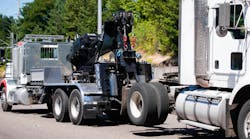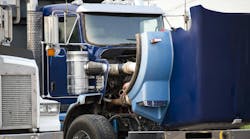In a paper written for Liberty Mutual, George S. Benjamin, M.D., the company’s medical director for loss prevention and managed care services, said that safety problems associated with commercial truck driving are linked to vehicle operation and material handling. He said the most common reason why drivers seek medical treatment is because they have sustained acute injuries.
In order of frequency, Benjamin said these injuries result from falls, collisions of the drivers and their vehicles with stationary or moving objects, strains, impacts, jolts, vehicular collisions, and foreign particles in the eye.
However, he added that truck drivers also are prone to more than their share of chronic complaints and illnesses, with back and cardiovascular disorders rank ahead of accidents as causes of permanent disabilities. In one study, nearly 70% of drivers complained of regular back pain as opposed to only 25% of the members of a control group, he said. In another study, 20% of drivers had high blood pressure.
Benjamin pointed out other health risks to truck drivers. They include ergonomic hazards, such as long periods of time sitting down and poor posture, which leads to stiff muscles and overall physical deconditioning. Engine and cab noise can also exceed safe limits, he added. Those two factors, combined with road noise, account for significant hearing loss among drivers, with cab vibrations contribute to back pain and fatigue. Temperature levels in cabs may be poorly controlled, which contributes to fatigue, cardiovascular stress, and mental stress.
There are also a series of chemical hazards to drivers as well, Benjamin said. Thousands of types of hazardous chemicals are shipped by truck each year, including waste contains combinations of chemicals as well as irritating dusts and infectious agents, he said. Exposure to oil, engine exhaust, and carbon monoxide is common both on the highway and at loading docks. Studies have shown increased incidence among drivers of lung, kidney, and bladder cancers. However, the relative contribution that engine exhaust emissions and tobacco smoking make to these findings is controversial, Benjamin pointed out.
Then there are lifestyle hazards. Traveling for prolonged periods present serious obstacles to maintaining healthy lifestyles. Foods available on the road are high in fat, salt, and calories. This type of diet, coupled with hours of limited physical activity, leads to obesity, high blood pressure, and heart disease, said Benjamin.
To combat those issues, Benjamin said attention is being focused on safety-device design, which minimizes the occurrence of vehicular accidents, and ergonomic vehicle design, which minimizes the health risks resulting from confined cabs, engine and cab noise and vibration, and poor temperature controls.
Also, more attention is focused on regulating the transportation and handling of hazardous materials. Proper vehicle maintenance, protective clothing, ventilation of exhaust during truck repairs, placarding vehicles hauling hazardous materials, and training drivers to handle emergency situations resulting from accidents or leaks all are measures that control or minimize the health risks associated with exposure to hazardous chemicals, he said.
Yet little attention is being devoted to health care and health education for drivers, Benjamin warned. From an occupational health standpoint, the situation is far from satisfactory, and few medical solutions have been proposed. He said that fatigue contributes to nearly 70% of truck accidents while little more than 10% of truck accidents are attributed to improper vehicle maintenance. Considering that 25% of all compensation-covered fatalities are vehicle-related, it makes sense to attack all significant fatality causes -- including poor health habits, Benjamin said.


